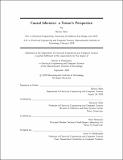Causal inference : a Tensor's perspective
Author(s)
Shen, Dennis,Ph. D.Massachusetts Institute of Technology.
Download1227768557-MIT.pdf (4.613Mb)
Other Contributors
Massachusetts Institute of Technology. Department of Electrical Engineering and Computer Science.
Advisor
Devavrat Shah and Mark Abramson.
Terms of use
Metadata
Show full item recordAbstract
Quantifying the causal effect of an intervention is a ubiquitous problem that spans a wide net of applications. Typically, this quantity is measured through the difference in outcomes under treatment (e.g., novel drug) and control (e.g., placebo). However, only one outcome ever be revealed - this is the fundamental challenge in causal inference. In order to overcome this obstacle, there have been two main types of studies: experimental (ES) and observational (OS). While the former conducts carefully designed experiments, the latter utilizes observed data. In this thesis, we reinterpret the classical potential outcomes framework of Rubin through the lens of tensors. Formally, each entry of the potential outcomes tensor is associated with a tuple of entities; namely, the measurement (e.g., time), unit (e.g., patient type), and intervention (e.g., drug). Subsequently, each study can be characterized by a unique sparsity pattern, which allows us to translate the age old problem of estimating counterfactuals into one of tensor estimation. As an added benefit, our tensor formulation also opens the door to discussions about the computational and statistical trade-offs of causal inference methods, a conversation (to the best of our knowledge) that has largely not yet been had. Ultimately, this novel perspective, coupled with basic principles of the popular synthetic control method for OSs, enables us to provably estimate counterfactual potential outcomes for every unit under all treatments and control with low sample and computational complexity. As a result, we can customize treatment plans for every unit in a computationally tractable and data-efficient manner. Pleasingly, we show that this result bears implications towards what-if scenario planning, drug discovery, and personalized, data-efficient randomized control trials. Methodically, we furnish a data-driven hypothesis test to check when our algorithm can reliably recover the underlying tensor. The key technical contribution of this thesis advances the state-of-the art analysis for principal component regression.
Description
Thesis: Ph. D., Massachusetts Institute of Technology, Department of Electrical Engineering and Computer Science, September, 2020 Cataloged from student-submitted PDF of thesis. Includes bibliographical references (pages 177-185).
Date issued
2020Department
Massachusetts Institute of Technology. Department of Electrical Engineering and Computer SciencePublisher
Massachusetts Institute of Technology
Keywords
Electrical Engineering and Computer Science.